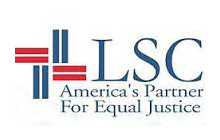"Fast and Cheap" Evictions Help Fuel Housing Crisis, New LSC Brief Finds
 The Legal Services Corporation (LSC) released an interactive brief today exploring variations in the speed and cost of eviction in the U.S. and the implications these trends have for tenants. The brief examines the timelines and costs of eviction for nonpayment of rent – the most common reason landlords file for eviction – based on the laws in 56 states and U.S. territories.
The Legal Services Corporation (LSC) released an interactive brief today exploring variations in the speed and cost of eviction in the U.S. and the implications these trends have for tenants. The brief examines the timelines and costs of eviction for nonpayment of rent – the most common reason landlords file for eviction – based on the laws in 56 states and U.S. territories.
“LSC’s new brief provides critical data on current eviction laws bearing directly on how easily tenants can lose their homes,” stated LSC President Ronald Flagg. “For example, laws in some jurisdictions permit tenants to be evicted just two weeks after missing a rent payment. And some jurisdictions set their eviction filing fees at below $50.”
Tenants typically face a short turnaround time between receiving an eviction summons and the eviction hearing. Nationwide the median is only five days, which gives tenants little time to seek legal help in navigating the confusing eviction process. They may also struggle with last-minute logistical challenges: needing to take time off work, obtain childcare or arrange transportation to attend the hearing.
In 11 states, tenants can be evicted from their homes in as little as two weeks after missing a rent payment. For low-income renters, this can mean going from housed to homeless in a matter of days.
Even if tenants have enough time to reach out to legal services providers, they may not know legal help is available. Only six states – Arizona, Michigan, Ohio, Oregon, Texas and Washington – require eviction summonses to include information on how to access eviction-related legal services, like those provided by LSC-funded organizations.
The relatively low cost of filing an eviction for nonpayment of rent has encouraged some landlords to use eviction as a standard rent collection tool. The brief notes that 22 states and territories have eviction filing fees below $100, 13 of which are below $50. As of January 2021, the median filing fee of the states and territories LSC studied was only $75.
Policymakers and public officials have taken note of the role short timelines and low filing fees play in perpetuating the country’s eviction crisis. Attorneys general and other public officials in at least 17 states and the District of Columbia have called for changes to make the eviction process fairer for all parties.
Regardless of outcome, every eviction filing leaves a stain on tenants' records that can have long-term negative repercussions, potentially impairing their ability to obtain future private rental housing, housing subsidy vouchers or loans. This is true even if the eviction case was dismissed by the judge or the tenant won the case.
The brief is based on LSC’s Eviction Laws Database, produced in partnership with the Center for Public Health Law Research at Temple University's Beasley School of Law. The database covers eviction laws in all 50 states, the District of Columbia and U.S. territories.
Explore the interactive brief or read the PDF version. Learn more about LSC's congressionally directed eviction study.